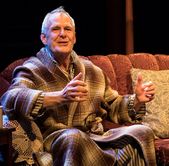
CurtainUp
The Internet Theater Magazine of Reviews, Features,
Annotated Listings
A CurtainUp London Review
The March on Russia
|
" I were climbing over that wall when the eunuch got me with his sword." — Tom Pasmore
|
 v v
Ian Gelder as Tom Pasmore (Photo: Helen Maybanks)
|
The play is set in the living room of the retirement bungalow paid for by their son Colin. Tom Pasmore (a wonderfully convincing portrait by Ian Gelder) has a 3am conversation with his son Colin over the ever present cup of tea. Colin has turned up unexpectedly for their diamond wedding anniversary, celebrating sixty years of being married. Sixty years of happiness does not adequately describe the marital dynamic.
As the two men talk in a relaxed way, Mrs Pasmore (Sue Wallace) interrupts the good humour. As Tom wishes her a happy anniversary, she rebuffs him with a reminder that as they married at 12noon, and it is 3am, the sixty years is not yet up. This carping and hair splitting pedantry will define her character and give a sour note to her interjections albeit that they will also make us laugh. You definitely get the impression that the playwright did not like his mother.
Tom and Colin alone have talked about Tom's early life as an engineer and on board a merchant vessel sent to relieve White Russians escaping from the Russian Revolution in 1917. Tom graphically describes the sea voyage, to Sebastapol and then the march by land to Rostov-on-Don in a wonderfully evocative way. When this play was written in 1989, Perestroika would have been occupying the political thoughts of socialists who could observe the outcome of the 1917 Russian Revolution.
The next morning, the two Pasmore daughters, Colin's sisters arrive. Wendy (Sarah Belcher) is the youngest, and her life is in a state of flux as her political career has taken a turn as an independent councillor and her marriage is almost over but she is capable. Then arrives the eldest child, almost always called "Our Eileen" in the Northern way of discriminating her from all the other Eileens (Connie Walker, smiling until she grimaces) as she spreads goodwill and nicey, nicey pleasantness.
The humour is in the banter and the constant complaining spin from Mrs Pasmore, who as a miner's wife in the 1980s has voted Conservative, for Margaret Thatcher, after the miners strikes about the threat to close the mines dominated the mid 1980s and led to changes in the law on trade union picketting.
After the interval, when they return from a meal at a hotel, the cracks start to open up. Tom talks about the hard life he had as a miner, she concentrates on their lack of money and the economies she had to make. But then the accusations cut deeper and a spat between Wendy and her mother has the mother saying, "You were never very fond of me," and worse, telling Wendy that she would not understand because she never had had a child. Wendy's childlessness is not a choice and her mother's judgment is cruel. Mrs Pasmore's belligerence and bitterness is well conveyed by Sue Wallace.
There is a brief moment when Colin talks to his sisters about his despondency but it is brief. The March on Russia was a futile exercise that saw the men march to Rostov-on-Don and back again. This long marriage has the same lack of purpose, an existence rather than a living and is probably a realistic picture of many surviving marriages. Wendy has the courage to look for something better.
This play was a prequel to Storey's 1972 novel Pasmore about the life of a university lecturer. In some ways reading this novel first might have increased my appreciation of this play. As it is, not having read the novel, I was left feeling that the interesting character of the son Colin (Colin Tierney) is sadly underdeveloped in The March on Russia. Am I interested enough to locate copy of Pasmore? Not really.
Search CurtainUp in the box below
PRODUCTION NOTES
The March on Russia
Written by David Storey
Directed by Alice Hamilton
Starring: Colin Tierney, Ian Gelder, Sue Wallace, Sarah Belcher, Connie Walker
Designer: James Perkins
Lighting Design: Nicholas Holdridge
Costume Design: Sophia Simensky
Sound Design and Composer: Harry Blake
Running time: Two hours 25 minutes with an interval
An Orange Tree Theatre Production in association with Up in Arms
Box Office: 020 8940 3633
Booking to 7th October 2017
Reviewed by Lizzie Loveridge based on 11th September 2017 performance at the Orange Tree, I Clarence Street, Richmond, Surrey TW9 2SA (Rail/Tube: Richmond)
Index of reviewed shows still running
REVIEW FEEDBACK
Highlight one of the responses below and click "copy" or"CTRL+C"
- I agree with the review of The March on Russia
- I disagree with the review of The March on Russia
- The review made me eager to see The March on Russia
Paste the highlighted text into the subject line (CTRL+ V):
Feel free to add detailed comments in the body of the email. . .also the names and emails of any friends to whom you'd like us to forward a copy of this review.
For a feed to reviews and features as they are posted at http://curtainupnewlinks.blogspot.com; to your reader
Curtainup at Facebook . . . Curtainup at Twitter